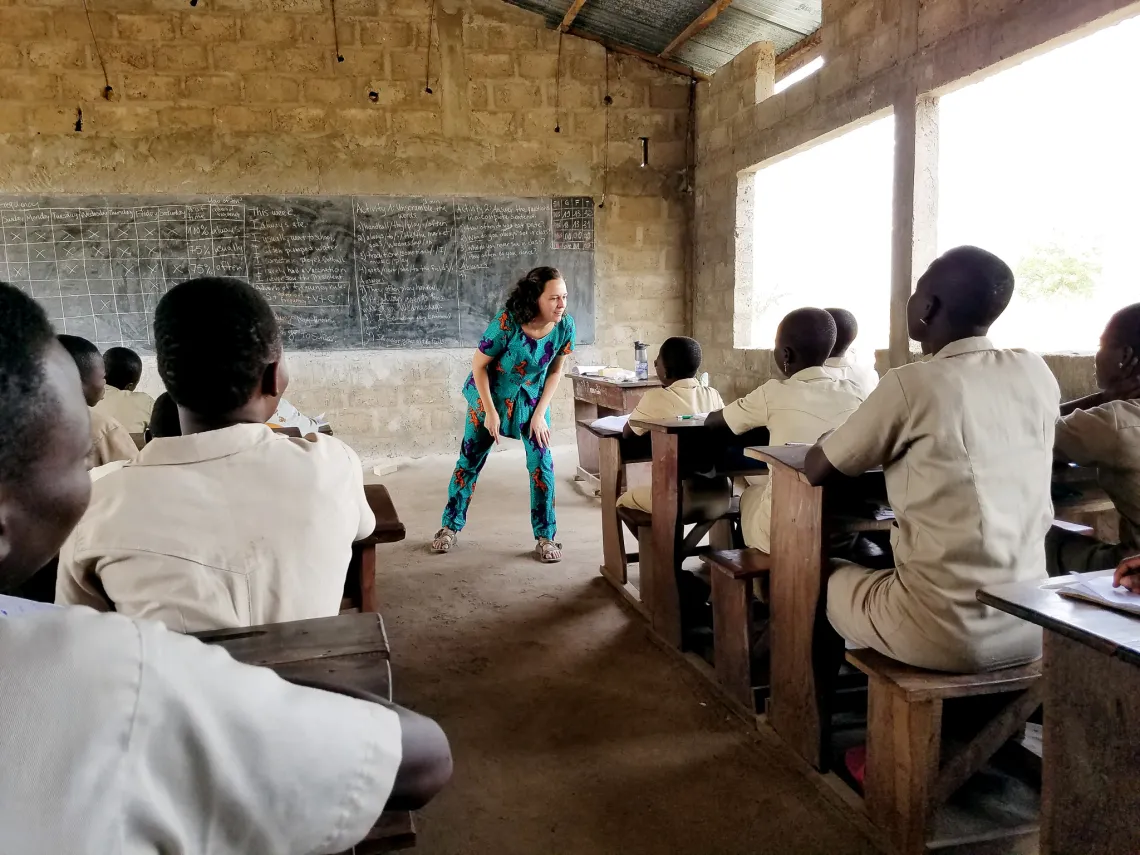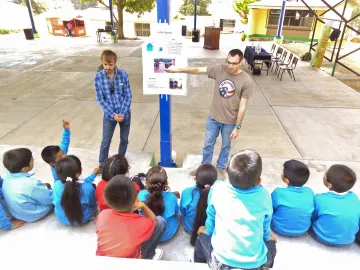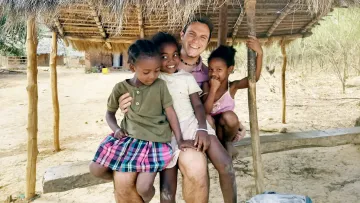On Their Toes
Volunteers returning from the Peace Corps chart their next steps.

Rachel Hansen taught middle school in rural Benin.
Photo: Rachel Hansen
One came from a rural village in Africa. Another traveled from the urban streets of Querétaro and a third from a remote island in the Indian Ocean.
They joined the more than 425 former Peace Corps volunteers who have returned to the U.S. from places like Benin, Mexico or Madagascar, coming to the University of Arizona thanks to a coveted fellowship that helped them earn their master’s degrees.
For more than 25 years, UArizona has ranked among the top U.S. universities enrolling volunteers who have returned from the Peace Corps in the Paul D. Coverdell Fellows Program, which guides them through graduate work and often into careers in public service.
The program is named for Coverdell, a U.S. senator from Georgia, who directed the Peace Corps under President George H.W. Bush and modernized its mission.
Check out these recent UArizona volunteers’ stories.
Rachel Hansen ’23, volunteer in Benin
When Rachel Hansen landed in rural Benin for her Peace Corps volunteer tour, she found herself surrounded by new languages, like Idatcha and Fon, two of Benin’s 60-some local languages.
“I was in the middle of the bush,” she recalls. Benin, a small West African country just west of Nigeria, is known as the birthplace of the respected religious tradition called Vodun and for having had the only all-female army in modern history. Hansen taught English at a middle school in central Benin.
Returning from her two years there, Hansen was awarded a Coverdell Fellowship, part of a national program that provides financial support for volunteers who enroll in graduate study after concluding their service. The volunteers, in turn, participate in an outreach assistantship in underserved communities.
In 2023, Hansen received her master’s degree in human language technology, an interdisciplinary field incorporating computational linguistics, natural language processing, computer science and AI.
Her work in Benin, she says, helped her secure a top job at ServiceNow, a leading global software company based in Santa Clara, California, using AI to enhance employee and customer experiences.
“I was competing with software engineers,” she says. “What I had was linguistics. And that helped land a job working in a team on AI and language.” In Benin, one of the richest linguistic zones in the world, she was immersed in the field where she found her personal mission. Now, she aims to help create software that will allow native speakers of any Benin language to ask questions on the web and get answers in their own language.
“I love languages and technology, and in Benin I noticed that people who wanted to use smartphones would have to work in French,” Hansen says. “It made my heart so sad to think they didn’t have the same access I do as an English speaker. My dream is to watch someone from my village use voice technology in their own language.”
Brennen O’Donnell ’19, volunteer in Mexico
Some days in Mexico, Brennen O’Donnell taught organic gardening in Spanish. Other days, he organized environmental clubs or promoted ways to help people in the city of Querétaro adapt to climate change.
Throughout his two years of evolving assignments as a Peace Corps volunteer, he says, he learned a lot about resiliency by responding to his community. And that, in turn, helped him through a 2019 UArizona master’s degree in public administration, which in turn led to a position at the U.S. General Services Administration.

Brennen O’Donnell ran environmental programs in Querétaro, Mexico.
Photo: Brennen O’Donnell
As an undergraduate, O’Donnell was studying environmental science when he met a recruiter for the Peace Corps. “I heard their sales pitch, and it sounded fascinating,” he says. “At first, two years of service sounded like a really long time. But it was definitely worth it.”
In 2016, the Peace Corps placed him at Mexico’s Secretariat of Environment and Natural Resources, or Semarnat — similar to the U.S. Environmental Protection Agency — working in Querétaro, a history-rich city north of Mexico City.
“In Mexico, the work was all in Spanish,” O’Donnell says. “It took a while to get comfortable, but that’s all part of the experience. When you are surrounded by the work, you learn fast. And that’s one thing I definitely liked: getting used to change.
“In the Peace Corps, you can have an idea, and you say, ‘Let’s try this.’ And that is what you’ll be doing. It teaches you creativity.”
After returning from Mexico, O’Donnell qualified for UArizona’s Coverdell Fellows Program to earn his graduate degree from the School of Government and Public Policy. His internship took him to work with the Arizona Master Naturalist Association, helping libraries expand programs in underserved areas.
He spotted an ad for a position in Tucson with the GSA Real Estate Division on a Peace Corps job-posting board. Soon, he was on his way. The transition was smooth, he says, because former Peace Corps volunteers enjoy several incentives to enter federal jobs. “If you meet the regulations for a position,” O’Donnell says, “the agency doesn’t need to carry out a competitive search. They can just hire you. And that helps them, too.”
And Peace Corps service was a natural preparation for his GSA work, O’Donnell says. He learned to adapt quickly to new tasks, for example. “Things change according to the community’s wishes, and it teaches you to stay on your toes,” he says. “That’s part of the experience.”
David Morales ’23, volunteer in Madagascar
Early mornings, he was up at dawn and prepping to teach English for four hours.
At midday, David Morales would make his lunch of rice and beans with tomato sauce, as would most people in Befandriana- Avaratra, a small town in the island nation of Madagascar, off southern Africa. Next, he would plan out the day’s meeting of the English Club — all part of his work as a Peace Corps volunteer from 2016 to 2018.
Aside from teaching English to high schoolers, Morales was educating himself with personal lessons that he’d carry back to the United States — and to UArizona, where he would later complete a master’s degree in hydrology with support from a Coverdell Fellowship. It all fit together, he says.
“I learned to have patience by working with local people and to respond to their needs. Our mutual learning went far beyond languages,” he recalls.
Using his newly acquired Tsimihety, a dialect of the Malagasy language, he taught at girls’ empowerment camps. “We were ‘time rich’ as volunteers,” Morales says, “and I used that time to make connections with my neighbors’ lives.”

David Morales taught English as a second language in Madagascar.
Photo: David Morales
He taught students about the United States as he joined them in activities that were part of their own cultures, like plowing fields and sharing meals. “Walking out to the countryside in search of fresh mangoes or a missing calf,” he says, “we shared our lives and cultures.”
He planted a garden to teach nutrition. They showed him how to fish the river with a bamboo pole. Some days he would go up into the mountains by bicycle to visit their homes.
Through those two years in Madagascar, Morales became aware of the many ways of knowing about the world. “What seems obvious to you at first may not be the whole story. In college, you learn ‘do homework; take tests.’ But in the Peace Corps, you learn that life is not linear; life is something very different.”
Back home, he got to thinking more about climate change and scarce water resources, and the hydrology program at UArizona seemed a natural fit. As part of the Coverdell program, he would undertake an outreach internship. Morales was assigned to UArizona’s distinguished Water Resources Research Center, working with its director, Sharon Megdal. “That opened my eyes to collaborative water resource management — to problem solving,” Morales says.
Today, in a position with the U.S. Geological Survey, Morales applies various methods of hydrogeologic investigation, including groundwater modeling, in field work across Arizona. Recently, he was part of a team studying the geologic components of the Douglas basin in southeastern Arizona, using skills like controlled source audiofrequency magnetotellurics.
His internship was a key, he says. “It gave me opportunities to explore the world beyond my studies.”
